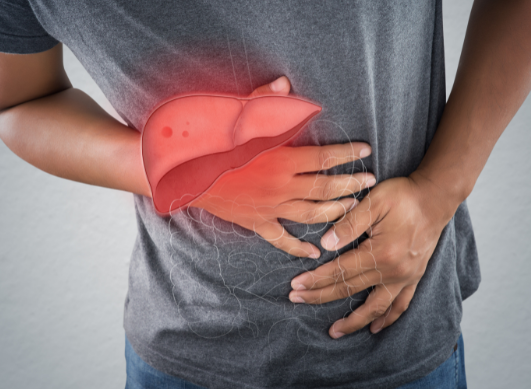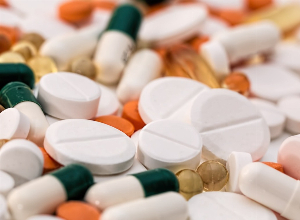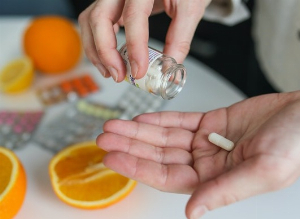Which drugs can damage the liver?
Published 15 Apr 2024 • By Carenity Editorial Team
The liver metabolizes many medications along with the kidneys. These organs therefore play a huge role in the elimination of drugs from the human body.
When taken correctly, most market-approved drugs rarely present a serious risk to the liver, or to the body in general, compared to the benefit they provide. However, some select treatments, even when taken at a therapeutic dose, can impact the liver, so vigilance is necessary. Moreover, many drugs, when taken incorrectly, for example in cases of overdose, can pose a real risk to the liver. This is referred to as misuse.
So, which drugs are the ones that can damage the liver and hence be taken with caution?
We discuss it all in our this article!

What is an overdose?
An overdose is defined as using an unsuitable dosage, an excessive amount per dose or per day, as well as not respecting a minimum interval between doses.
If quickly addressed, an overdose might not leave any lasting effects, but it can also cause harmful or even dangerous effects. Indeed, some medications can cause liver damage.
What are the symptoms of liver damage?
When the liver is damaged, many symptoms can appear:
- Yellowing of the whites of the eyes or skin,
- Fatigue,
- Abdominal pain and liver swelling,
- Nausea, vomiting, and loss of appetite,
- Unusual colour of stools and urine.
These liver symptoms are not exhaustive and can vary from patient to patient. So, if you notice any symptoms, consult a doctor immediately.
What are the drugs known to impact liver health?
Paracetamol
Paracetamol is the most frequently prescribed medication for pain or fever, for both children and adults.
It's important to know that for children, the dosage depends on weight. The recommended dosage is as follows: 15mg/kg per dose. And you should not exceed 500mg of paracetamol per dose for children under 15 years old, even if the dose calculation is higher. Moreover, you must wait at least 6 hours between doses for children.
For adults, the recommended dose is a maximum of 1g of paracetamol per dose, and you should not take it more than 3 times a day. The interval between 2 doses is between 4 and 6 hours for adults.
Indeed, an overdose of paracetamol can cause irreversible liver damage because it is responsible for eliminating paracetamol.
Paracetamol is metabolized, meaning eliminated, under normal (therapeutic dose) conditions primarily by glucuronidation or sulfation. These are chemical reactions from which a new molecule is formed, which can then be eliminated in the urine.
However, this elimination method has a limit in terms of quantity. Thus, when too much paracetamol is consumed, another elimination pathway is activated, through the liver. An enzyme, called cytochrome P450, will then transform paracetamol into a toxic compound, which is not eliminated and causes cell death by necrosis in the liver cells, causing irreversible damage.
In the case of a high overdose of paracetamol not addressed, fulminant drug-induced hepatitis can occur and become fatal.
NSAIDs
Other drugs used as painkillers, such as non-steroidal anti-inflammatory drugs (NSAIDs) like diclofenac or ibuprofen, can also pose a risk to the liver in case of overdose. They are contraindicated in patients with severe liver failure.
Antifungals
Antifungals are treatments aimed at eliminating the fungi responsible for infections called mycoses. Itraconazole or voriconazole are two antifungals that are metabolized by the liver. Therefore, it is necessary to respect the prescribed doses to not damage the liver. Moreover, there are rare but serious cases of hepatitis following the intake of these drugs. Vigilance is crucial when taking them.
Chemotherapies
Chemotherapy treatments for cancer are known to damage the liver. The most well-known, like methotrexate, cisplatin, or cyclophosphamide, can pose risks to the liver even at recommended doses, although the benefit/risk balance is favourable.
Indeed, in some people with certain risk factors, such as a liver already weakened by other diseases, like obesity or diabetes, methotrexate can promote liver damage. Moreover, concurrent alcohol consumption with methotrexate intake significantly increases the risk of liver damage.
Therefore, do not consume alcohol if taking chemotherapy. Also, be vigilant for any general side effects and liver symptoms when taking these treatments. In case of symptoms, talk to your doctor or pharmacist immediately.
Was this article helpful to you?
Give it a "Like" and share your thoughts and questions with the community in the comments below!
Take care!
Sources :
Le Top 3 des médicaments les plus toxiques pour le foie, Le Quotidien du Pharmacien
Paracétamol et risque pour le foie : un message d’alerte ajouté sur les boîtes de médicament - Communiqué, ANSM
Élimination hépatobiliaire, Cismef
Paracétamol: toxicité hépatique aux doses thérapeutiques et populations à risque, Mariam Seirafi, Anne Iten, Antoine Hadengue
Le Paracétamol, Pharmacodel
Mort de Naomi Musenga : le paracétamol, courant mais potentiellement dangereux, Ouest France
Novel acetylcysteine regimens for treatment of paracetamol overdose, W. Stephen Waring
ACETYLCYSTEINE VIATRIS CONSEIL 200 mg, Base de données publique des médicaments
Troubles du foie, Société Canadienne du Cancer
Foie et méthotrexate, D. Laharie, E. Terrebonne, J. Vergniol, E. Chanteloup, E. Chabrun, P. Couzigou, V. de Lédinghen
CYCLOPHOSPHAMIDE REDDY PHARMA 2000 mg/4 mL, Base de données publique des médicaments

 Facebook
Facebook Twitter
Twitter


